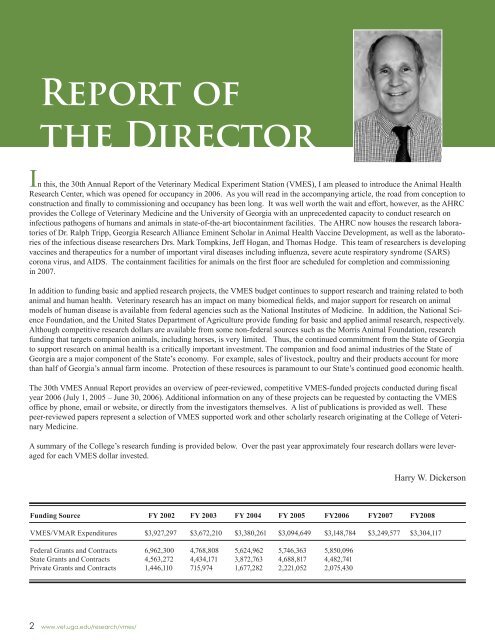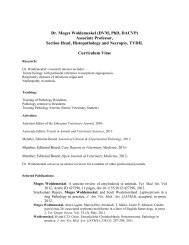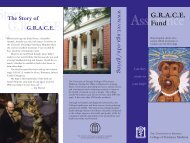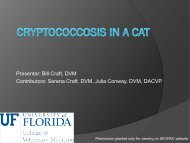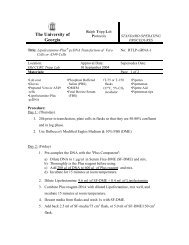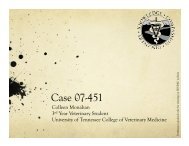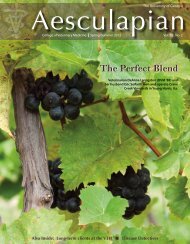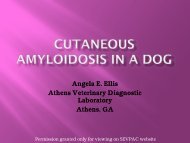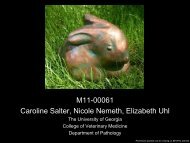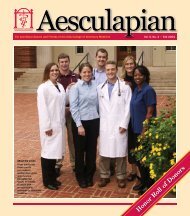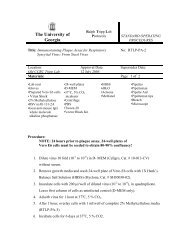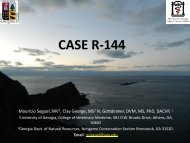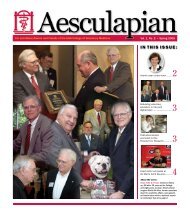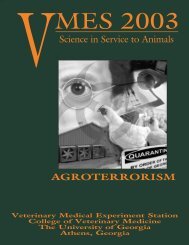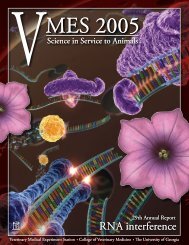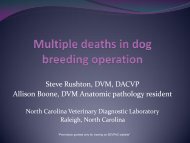The Animal Health Research Center - University of Georgia College ...
The Animal Health Research Center - University of Georgia College ...
The Animal Health Research Center - University of Georgia College ...
Create successful ePaper yourself
Turn your PDF publications into a flip-book with our unique Google optimized e-Paper software.
Report <strong>of</strong><br />
the Director<br />
In this, the 30th Annual Report <strong>of</strong> the Veterinary Medical Experiment Station (VMES), I am pleased to introduce the <strong>Animal</strong> <strong>Health</strong><br />
<strong>Research</strong> <strong>Center</strong>, which was opened for occupancy in 2006. As you will read in the accompanying article, the road from conception to<br />
construction and finally to commissioning and occupancy has been long. It was well worth the wait and effort, however, as the AHRC<br />
provides the <strong>College</strong> <strong>of</strong> Veterinary Medicine and the <strong>University</strong> <strong>of</strong> <strong>Georgia</strong> with an unprecedented capacity to conduct research on<br />
infectious pathogens <strong>of</strong> humans and animals in state-<strong>of</strong>-the-art biocontainment facilities. <strong>The</strong> AHRC now houses the research laboratories<br />
<strong>of</strong> Dr. Ralph Tripp, <strong>Georgia</strong> <strong>Research</strong> Alliance Eminent Scholar in <strong>Animal</strong> <strong>Health</strong> Vaccine Development, as well as the laboratories<br />
<strong>of</strong> the infectious disease researchers Drs. Mark Tompkins, Jeff Hogan, and Thomas Hodge. This team <strong>of</strong> researchers is developing<br />
vaccines and therapeutics for a number <strong>of</strong> important viral diseases including influenza, severe acute respiratory syndrome (SARS)<br />
corona virus, and AIDS. <strong>The</strong> containment facilities for animals on the first floor are scheduled for completion and commissioning<br />
in 2007.<br />
In addition to funding basic and applied research projects, the VMES budget continues to support research and training related to both<br />
animal and human health. Veterinary research has an impact on many biomedical fields, and major support for research on animal<br />
models <strong>of</strong> human disease is available from federal agencies such as the National Institutes <strong>of</strong> Medicine. In addition, the National Science<br />
Foundation, and the United States Department <strong>of</strong> Agriculture provide funding for basic and applied animal research, respectively.<br />
Although competitive research dollars are available from some non-federal sources such as the Morris <strong>Animal</strong> Foundation, research<br />
funding that targets companion animals, including horses, is very limited. Thus, the continued commitment from the State <strong>of</strong> <strong>Georgia</strong><br />
to support research on animal health is a critically important investment. <strong>The</strong> companion and food animal industries <strong>of</strong> the State <strong>of</strong><br />
<strong>Georgia</strong> are a major component <strong>of</strong> the State’s economy. For example, sales <strong>of</strong> livestock, poultry and their products account for more<br />
than half <strong>of</strong> <strong>Georgia</strong>’s annual farm income. Protection <strong>of</strong> these resources is paramount to our State’s continued good economic health.<br />
<strong>The</strong> 30th VMES Annual Report provides an overview <strong>of</strong> peer-reviewed, competitive VMES-funded projects conducted during fiscal<br />
year 2006 (July 1, 2005 – June 30, 2006). Additional information on any <strong>of</strong> these projects can be requested by contacting the VMES<br />
<strong>of</strong>fice by phone, email or website, or directly from the investigators themselves. A list <strong>of</strong> publications is provided as well. <strong>The</strong>se<br />
peer-reviewed papers represent a selection <strong>of</strong> VMES supported work and other scholarly research originating at the <strong>College</strong> <strong>of</strong> Veterinary<br />
Medicine.<br />
A summary <strong>of</strong> the <strong>College</strong>’s research funding is provided below. Over the past year approximately four research dollars were leveraged<br />
for each VMES dollar invested.<br />
Harry W. Dickerson<br />
Funding Source FY 2002 FY 2003 FY 2004 FY 2005 FY2006 FY2007 FY2008<br />
VMES/VMAR Expenditures $3,927,297 $3,672,210 $3,380,261 $3,094,649 $3,148,784 $3,249,577 $3,304,117<br />
Federal Grants and Contracts 6,962,300 4,768,808 5,624,962 5,746,363 5,850,096<br />
State Grants and Contracts 4,563,272 4,434,171 3,872,763 4,688,817 4,482,741<br />
Private Grants and Contracts 1,446,110 715,974 1,677,282 2,221,052 2,075,430<br />
2 www.vet.uga.edu/research/vmes/


